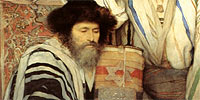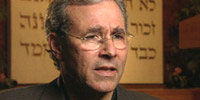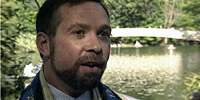BOB ABERNETHY: On our Viewer's Guide calendar this week, the solemn Jewish holiday of Tisha b'Av, one of the saddest days of the Jewish year. On Tisha b'Av, Jews fast and grieve, sometimes sitting on the synagogue floor, remembering the destruction of ancient Israel's first and second temples in Jerusalem and the 2,000 years of exile and suffering that followed. We talked with Robbie Friedman of Silver Spring, Maryland, about the holiday and the temple; also with New York writer Francine Klagsbrun, author of "Jewish Days."
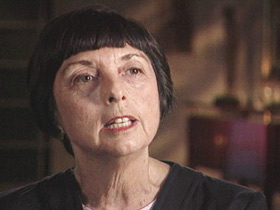
FRANCINE KLAGSBRUN (Author): Our temple, for us, was the center of the universe. We saw the temple as being the center of the Earth, actually. There's a tradition that the temple was built in the same place where Abraham went to sacrifice Isaac and was saved from sacrificing his son. When I look at the Western Wall, which is a remnant of the Second Temple, it connects me with those people that -- my great-great-great-ancestors from way back, for whom -- were praying at that temple, and that is an overwhelming, emotional feeling.
ROBERT FRIEDMAN: I stood in the same place that thousands of years ago my ancestors stood, where they touched the places that I touched, where they said the prayers that I said. And you just feel very much a piece of history, that you're reliving the past.
Ms. KLAGSBRUN: Even while the temple stood, there were the beginnings of prayer groups, meeting in prophet's homes. So that when the temple was destroyed and the Jewish people were destroyed -- I mean, the Jewish religion wasn't destroyed, because it was able to be carried with the people wherever they went. They could carry the Torah with them where they went.
Mr. FRIEDMAN: It's important that we remember our past so that we don't have to follow the same fate in the future.
Ms. KLAGSBRUN: In real life, there were many, many political reasons why Israel fell. In tradition, it has been said that the First Temple was destroyed because the Jews were worshipping idols, and the Second Temple was destroyed because of what is called in Hebrew "sinat chinam," want and hatred among Jews themselves.
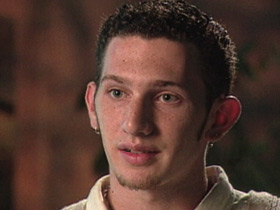
It's terribly important for Jews today, when there's a lot of fighting going on among them, to remember that we once had a temple and a tradition that Talmud says was destroyed because of want and hatred among ourselves.
Mr. FRIEDMAN: Well, I see, God willing, a land, a place where I can take my children, where I can take my grandchildren. I can grab my son by the hand, walk him to the Wall and just giving him the same feeling that I had when I stood there, or when the Israelites stood there thousands of years ago. Just to be in the place, to touch the same stone, to feel the same feeling.
ABERNETHY: Today, Jerusalem contains sites that are holy not only to Judaism but to Christianity and Islam as well. On the crest of Mount Moriah, where the Jewish temples once stood, now stands the Dome of the Rock, one of the three holiest shrines in Islam.



